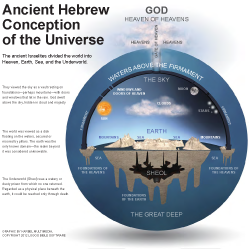26:1–14 Job is the only named speaker from this point until Elihu responds in ch. 32. However, his speech is broken at points (27:1; 29:1), making it unclear whether 26:1–31:40 is one long speech or several separate speeches. In ch. 26, Job rebukes Bildad for not offering anything helpful or new (vv. 2–4). He then praises God’s majesty and power (vv. 5–14). |
26:2 no power Job accuses Bildad of providing no help. Job earlier accused his friends of being worthless comforters (13:4; 16:2, 4–5).
26:4 have you uttered words Job mocks Bildad’s lack of originality in his previous speech—where his main point (25:4) had already been made repeatedly by Eliphaz (4:17–19; 15:14–16; 22:2).
26:6 Sheol The Hebrew text here uses the term she’ol, which is often transliterated in English translations as Sheol. Job has repeatedly referenced this dark, gloomy place. See note on 14:13.
for Abaddon The Hebrew word used here, avaddon, is used here as a synonym for the realm of the dead, she’ol. Avaddon refers to a place of destruction, perishing, or ruin. Compare note on 31:12.
there is no covering for Abaddon In extolling God’s greatness, Job points out that God can see all things, including the realm of the dead. See note on Prov 15:11.
 Old Testament Theology of the Afterlife
Old Testament Theology of the Afterlife
The Hebrew term for “Abaddon,” |
26:8 the water in its clouds Job moves from the realm of the dead (Job 26:5–7) to the sky to demonstrate that God’s supremacy spans the entire creation. Compare note on Gen 1:2.
26:10 He has described a circle on the face of the water See note on Gen 1:6–10.
26:12 Rahab The Hebrew word used here, rahav, likely refers to a sea monster (see Job 9:13 and note; 7:12; compare Psa 89:10; Isa 51:9–10). In the ancient Near East, creatures like these were seen as forces of chaos that needed to be subdued. See note on Gen 1:21.
26:14 the outer fringes of These mighty acts of God give only a glimpse of His power.
how faint is the word The mighty thunder and wind is only a whisper to God. This description anticipates God’s response in ch. 38, where God speaks from a whirlwind. Elsewhere, God speaks in a whisper (1 Kgs 19:11–13).
in a whisper (1 Kgs 19:11–13).

|
About Faithlife Study BibleFaithlife Study Bible (FSB) is your guide to the ancient world of the Old and New Testaments, with study notes and articles that draw from a wide range of academic research. FSB helps you learn how to think about interpretation methods and issues so that you can gain a deeper understanding of the text. |
| Copyright |
Copyright 2012 Logos Bible Software. |
| Support Info | fsb |
 Loading…
Loading…

 Abaddon
Abaddon 